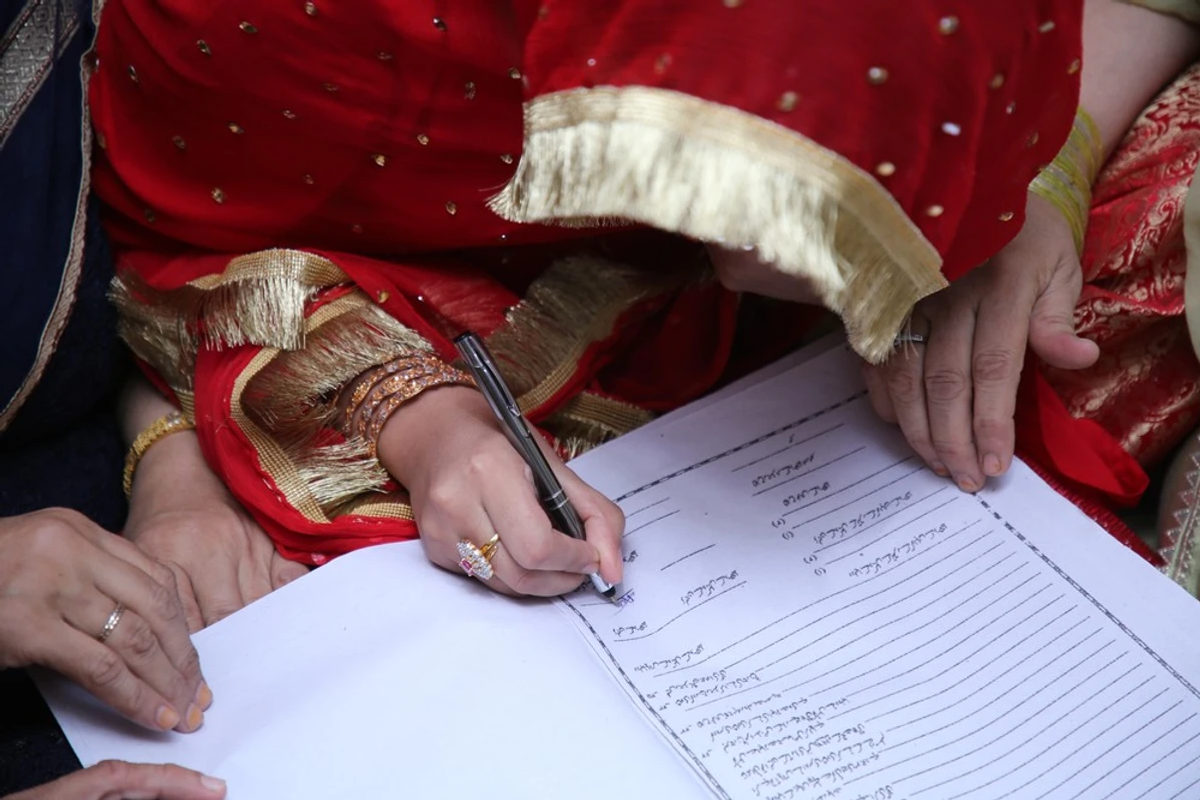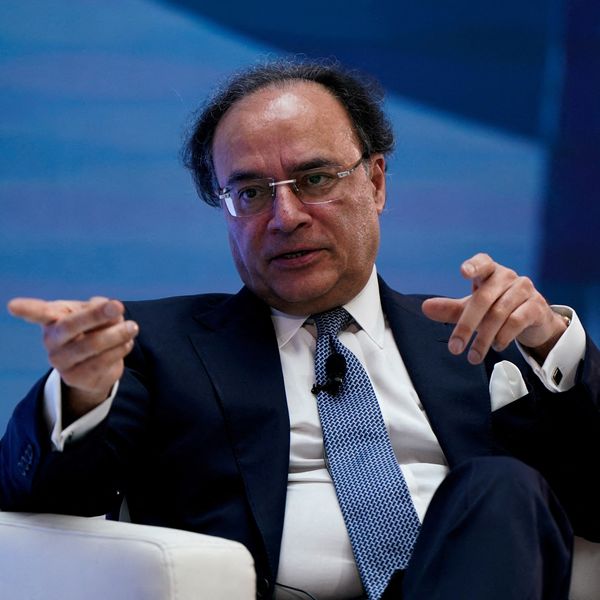Pakistan’s new child marriage law ignites battle between reform and resistance
An expert says the CII may approach the Federal Shariat Court, whose binding ruling could overturn or amend the law

Asma Kundi
Producer, Islamabad
Asma Kundi is a multimedia broadcast journalist with an experience of almost 15 years. Served national and international media industry as reporter, producer and news editor.

A bride is signing the Nikah document in this undated photo.
Shutterstock
Pakistan’s parliament has outlawed child marriage under the age of 18 in the Islamabad Capital Territory, marking what many see as a long-overdue attempt to align national laws with modern child protection standards.
But even before the ink has dried, the new legislation has ignited a storm of resistance from powerful religious institutions, legal experts and some political parties who argue it conflicts with both Islamic teachings and constitutional procedures.
The legislation, which replaces colonial-era marriage laws, sets 18 as the minimum age of marriage for both boys and girls within the capital territory. It also criminalizes cohabitation with minors, categorizing it as statutory rape punishable by up to seven years in prison and a minimum fine of one million rupees. Anyone found facilitating or coercing a child into marriage—including clerics or family members—faces the same prison term.
However, the legislation has drawn sharp criticism from the Council of Islamic Ideology (CII), which argues that the bill contradicts Islamic teachings, particularly in its classification of underage marriage as rape.
Despite this opposition, the bill has formally been signed into law by President Asif Ali Zardari, with proponents hopeful it will eventually be extended to other parts of the country.
Legal and constitutional hurdles
Despite its passage, legal experts and religious factions warn that the law may face serious legal challenges. Advocate Imran Shafique told Nukta that while the CII’s recommendations are not legally binding, Article 230 of the Constitution requires that all proposed legislation concerning Islamic injunctions be reviewed by the Council before being tabled.
He emphasized that the CII is a constitutionally recognized institution tasked with ensuring legislative conformity with Islamic principles. “By bypassing the Council’s input, the government has not only breached constitutional protocol but has also sidelined religious legal guidance,” he said.
Following the CII’s formal rejection of the law, Shafique added that the Council could now approach the Federal Shariat Court (FSC). Unlike the CII, whose role is advisory, the FSC holds judicial authority. A ruling from the court would be binding on the government and could result in the amendment or annulment of the law.
Religious opposition gains momentum
Opposition from religious political parties is also intensifying. Jamiat Ulema-e-Islam (JUI-F) lawmaker Shahida Akhtar Ali told Nukta that her party considers the law in direct violation of Article 227 of the Constitution, which requires all laws to be consistent with Islamic teachings.
“The government has pushed through this legislation while ignoring the recommendations of the CII,” she said. “JUI-F will hold an internal meeting to decide our strategy, but we will certainly register a strong protest both inside and outside parliament and pursue legal options to demand amendments.”
Elaborating on her party’s position, Shahida said, “We do not support restricting Nikah after puberty, as it is permitted in our Shariah. However, we agree that the age for rukhsati -- consummation and cohabitation -- can be set in accordance with a girl's physical and mental maturity.”
CII says it has fulfilled its role
Chairman of the CII, Dr. Muhammad Raghib Hussain Naeemi, told Nukta that the Council had already issued its constitutional recommendations, declaring the legislation incompatible with Islamic teachings.
“We have completed our role by providing our official input. The responsibility now lies with the government. The CII is not a political entity and will not engage further. It is now up to religious parties and the government to resolve this matter,” he stated.
Child rights activists voice mixed concerns
While child rights advocates have welcomed the intent behind the law, many warn of its legal inconsistencies and comparatively lenient punishments.
Afsheen Tehseen, former Chairperson of the National Commission on the Rights of Children (NCRC), acknowledged the bill’s positive intent but criticized its lack of alignment with existing laws.
“There are already statutes dealing with child labor and human trafficking that carry far stricter penalties -- up to 14 years in some cases. This new law, which prescribes a minimum of five years, may inadvertently offer a legal loophole to offenders,” she said.
Tehseen also highlighted a crucial gap: the absence of provisions addressing the legal and ethical complexities if a minor married off early becomes pregnant.
“In many of the cases we handled, the marriages were later declared void, but by then, the girl had already given birth. This situation remains unaddressed,” she added.
She further criticized the lack of stakeholder engagement in the legislative process. “This bill should have built upon the 2022 draft supported by the National Commission on the Status of Women (NCSW) and technically vetted by the NCRC, which had undergone extensive consultation. Drafting a separate law was not only redundant but also weakened the legal framework,” she argued.
Legal expert warns of redundancy and conflict
Sharafat A. Chaudry, former legal advisor to the NCSW, echoed concerns over the bill’s legal coherence. He pointed out that the new law conflicts with at least three existing statutes: the Prevention of Trafficking in Persons Act, 2018, relevant provisions of the Pakistan Penal Code related to child abuse, and the Islamabad Capital Territory Child Protection Act.
He criticized the bill for poor drafting and illogical penalties, adding that it does not even clarify the legal status of a marriage if the child’s age is later proven to be under 18. “The law, in its current form, is legally weak and could be challenged on multiple fronts,” he warned.
A fragmented legal landscape
Pakistan’s laws on child marriage remain fragmented. Sindh is currently the only province where the minimum age for marriage is uniformly set at 18 for both boys and girls, with a relatively robust enforcement mechanism.
In contrast, Punjab, Khyber Pakhtunkhwa, and Balochistan still rely on the colonial-era Child Marriage Restraint Act of 1929, which has weak penalties and inconsistent implementation.
Global and regional comparisons
In the broader Islamic world, minimum marriage ages vary. Algeria sets the minimum age for girls at 19, Libya at 20, and several countries -- including Saudi Arabia, Egypt, Lebanon, Iraq, Oman, Bangladesh, Syria, Tunisia, Turkey, and the UAE -- set it at 18.
Indonesia mandates 21 as the minimum marriage age for girls. In most Islamic countries, such ages are codified in civil law, with a few also attaching criminal penalties for violations.
The scale of the problem
Pakistan continues to grapple with alarming rates of child marriage.
According to UNICEF, the country ranks sixth globally in child marriages, with an estimated 19 million girls married before turning 18. Nearly half become mothers while still children themselves, jeopardizing their health, education, and future opportunities.
Only 13 percent of married girls complete secondary education, compared to 44 percent of their unmarried peers.
According to a 2018 demographic survey, 29 percent of Pakistani girls are married before age 18, and 4 percent before age 15. For boys, the corresponding figure stands at 5 percent.










Comments
See what people are discussing